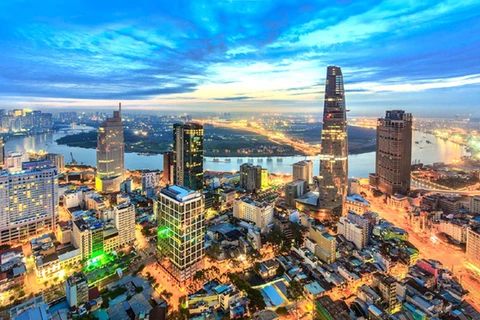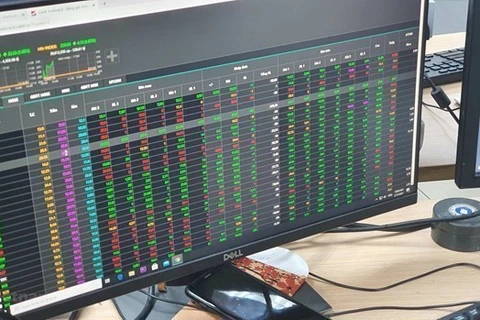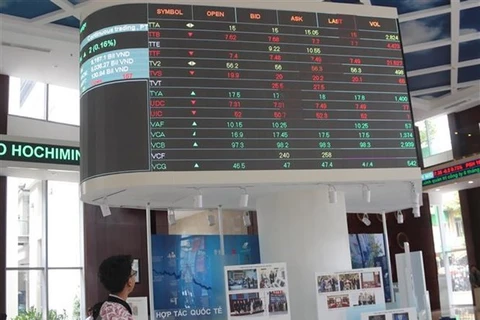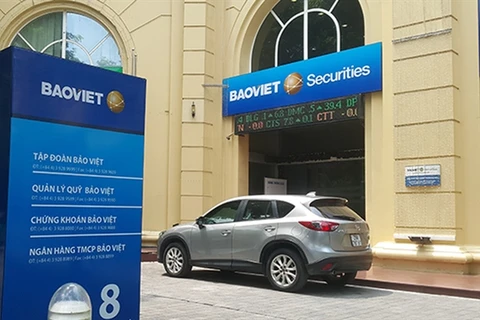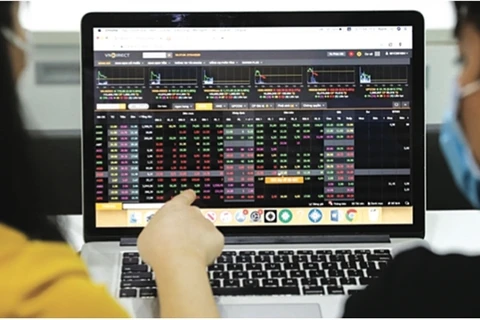Berlin (VNA) – German securities news site Börse-online.de on November 22 ran an article highlighting the high prospect of the stock market of Vietnam and the Vietnamese economy after COVID-19, underlining that the Southeast Asian country may grow 8 percent next year.
The article said that the difficult period has passed in Ho Chi Minh City. The country's economic and financial hub is now recovering. Stock values have increased over 5 percent in the past six weeks, and the risk of a recession seems to have been averted.
In early October, Vietnam eased lockdown measures as 76 percent of people in HCM City were fully vaccinated against COVID-19. The vaccination rate is also high in other cities and regions. This is a result of shifting the strategy from “zero COVID-19” to “living safely with COVID-19” by the government.
According to the article, the restrictions imposed across the country from July to the end of September to prevent the spread of the fourth wave of COVID-19 impeded the growth. In the 2009-2019 period, Vietnam’s economy achieved an annual growth rate of 7 percent.
To improve people’s living standards, the Government of Vietnam is partially equitising State-owned enterprises and listing these companies on the stock exchange. This contributes to making Vietnam increasingly attractive to foreign investors. In the future, the Government of Vietnam hopes to further accelerate the pace of reform.
The article cited analysis organisation DBS Vietnam that Vietnam’s gross domestic product (GDP) growth may return to 8 percent next year.
Not only in Ho Chi Minh City but also in Hanoi, the information technology centre of Da Nang, the port city of Hai Phong as well as in provinces such as Dong Nai and Binh Duong, more and more workers are returning to work.
Like equity investors, direct investors believe that Vietnam, which is still classified as a Frontier Market, will be moved to the group of Emerging Markets in the next few years. Therefore, despite the large investment, investors now want to further expand their activities.
Recently, LG Display spent 1.4 billion USD to expand its production facility in Hai Phong. Nestlé Group or Tetra Pak Group of Sweden also expanded production activities in Vietnam.
The article said that the difficult period has passed in Ho Chi Minh City. The country's economic and financial hub is now recovering. Stock values have increased over 5 percent in the past six weeks, and the risk of a recession seems to have been averted.
In early October, Vietnam eased lockdown measures as 76 percent of people in HCM City were fully vaccinated against COVID-19. The vaccination rate is also high in other cities and regions. This is a result of shifting the strategy from “zero COVID-19” to “living safely with COVID-19” by the government.
According to the article, the restrictions imposed across the country from July to the end of September to prevent the spread of the fourth wave of COVID-19 impeded the growth. In the 2009-2019 period, Vietnam’s economy achieved an annual growth rate of 7 percent.
To improve people’s living standards, the Government of Vietnam is partially equitising State-owned enterprises and listing these companies on the stock exchange. This contributes to making Vietnam increasingly attractive to foreign investors. In the future, the Government of Vietnam hopes to further accelerate the pace of reform.
The article cited analysis organisation DBS Vietnam that Vietnam’s gross domestic product (GDP) growth may return to 8 percent next year.
Not only in Ho Chi Minh City but also in Hanoi, the information technology centre of Da Nang, the port city of Hai Phong as well as in provinces such as Dong Nai and Binh Duong, more and more workers are returning to work.
Like equity investors, direct investors believe that Vietnam, which is still classified as a Frontier Market, will be moved to the group of Emerging Markets in the next few years. Therefore, despite the large investment, investors now want to further expand their activities.
Recently, LG Display spent 1.4 billion USD to expand its production facility in Hai Phong. Nestlé Group or Tetra Pak Group of Sweden also expanded production activities in Vietnam.
In terms of demographics, up to 68 percent of the total population of 97 million people are in the working age of 15 and 64, and about 1.5 million people enter the labour market every year. According to Vietnam Invest Review magazine, by 2030, Vietnam will have about 56 million people in the middle class compared to the current figure of 23 million.
Wages and incomes of Vietnamese people have also increased rapidly. According to data from the German Industry and Trade Association (GTAI), the average annual income of Vietnamese people in 2020 was 1,526 EUR, double that of 2012, and it is expected to be 5,156 EUR by 2030.
What investors are also very interested in is that the Vietnamese Government is aware of the importance of the stock exchange for economic development. Banks alone cannot finance the investment of domestic companies, so the capital market is needed and this market is also growing, according to the article.
Up to 745 companies are listed on the stock market compared to only 24 companies in 2004. By the end of 2020, the market capitalisation reached 160 billion EUR. In the future, many promising information technology companies will also appear on the list of stock exchanges.
The article said that Vietnamese leaders expected to promote the Internet economy as a driving force for growth and production, so they have advised and supported startups from this industry. It is expected that by 2025, 80 percent of public services will be handled online or via mobile phone. The Vietnamese Government has set a target that in the next three years, the digital economy will contribute 25-30 percent to GDP./.
Wages and incomes of Vietnamese people have also increased rapidly. According to data from the German Industry and Trade Association (GTAI), the average annual income of Vietnamese people in 2020 was 1,526 EUR, double that of 2012, and it is expected to be 5,156 EUR by 2030.
What investors are also very interested in is that the Vietnamese Government is aware of the importance of the stock exchange for economic development. Banks alone cannot finance the investment of domestic companies, so the capital market is needed and this market is also growing, according to the article.
Up to 745 companies are listed on the stock market compared to only 24 companies in 2004. By the end of 2020, the market capitalisation reached 160 billion EUR. In the future, many promising information technology companies will also appear on the list of stock exchanges.
The article said that Vietnamese leaders expected to promote the Internet economy as a driving force for growth and production, so they have advised and supported startups from this industry. It is expected that by 2025, 80 percent of public services will be handled online or via mobile phone. The Vietnamese Government has set a target that in the next three years, the digital economy will contribute 25-30 percent to GDP./.
VNA


